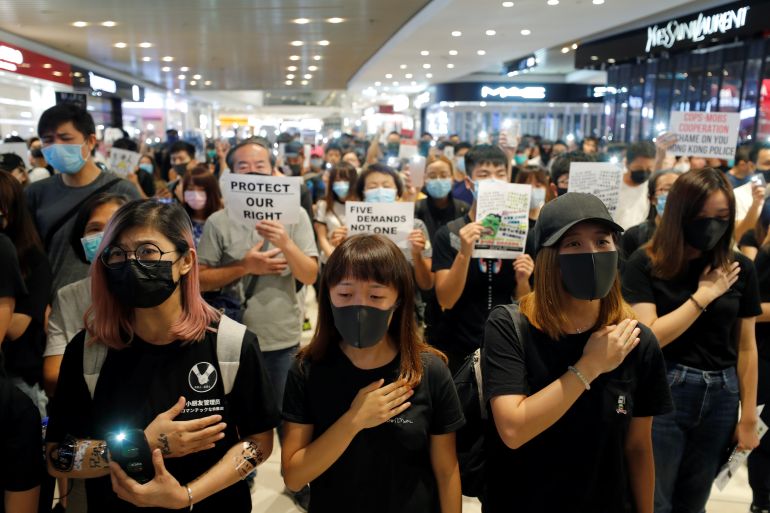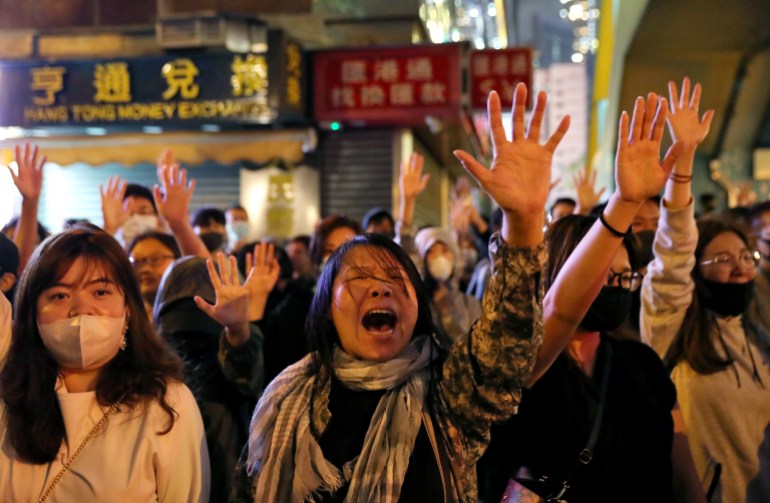Hong Kong court rejects gov’t request to ban popular protest song
Judge says banning the 2019 mass protest song, Glory to Hong Kong, would have ‘chilling effects’ on freedom of expression.

A court in Hong Kong has declined a government request to ban the protest song, Glory to Hong Kong, in a landmark decision that rejects a challenge to freedom of expression in the city.
The government’s application for an injunction came after Glory to Hong Kong was played mistakenly at several international sporting events, including rugby and ice hockey competitions, instead of China’s national anthem March of the Volunteers.
Keep reading
list of 3 itemsGlory to Hong Kong starts to disappear from online platforms
Once ’empowered’ Hong Kong activists face new security law
China-ruled Hong Kong does not have its own anthem but as a Chinese territory since its return from British rule in 1997, it uses China’s anthem.
The protest song was widely sung and played during the city’s pro-democracy protests in 2019. It was later deemed unlawful after China imposed a national security law on the financial hub as part of a crackdown on dissent.
In a written judgement rejecting the injunction on Friday, High Court Judge Anthony Chan wrote: “The court recognised the engagement of the right to freedom of expression in the consideration of this application”, while noting “chilling effects” that might be generated if the injunction was granted.
“It is by no means over-stretched to envisage that perfectly innocent people would distance themselves from what may be lawful acts involving the song for fear of trespassing the injunction which has severe consequences,” Chan added.
“I cannot be satisfied that it is just and convenient to grant the injunction. This application is accordingly dismissed.”

When the government first applied to the court for a total ban on the song in June, the song was soon taken down from several online music streaming platforms including iTunes and Spotify.
Hong Kong officials had also criticised Google for refusing to change its search results to display China’s national anthem instead of Glory to Hong Kong when users searched for Hong Kong’s national anthem.
A senior Hong Kong official, Sun Dong, said earlier this month that Google had told the government to first prove that the song violated local laws – thus prompting the legal application.
Google parent Alphabet gave no immediate response to Reuters news agency’s request for comment on the judgement. It was not immediately clear whether authorities would appeal the decision.
The Hong Kong Journalists Association (HKJA), which had opposed the government injunction bid, welcomed the decision.
“Exercising public power would create a chilling effect, threatening innocent people,” HKJA head Ronson Chan told reporters outside the court. “I think the judgement is very reasonable.”
According to a writ seen by Reuters, the government sought to ban the performance and dissemination of the song, including its adaptations, melody, lyrics; and also online, including on YouTube, saying it was an insult to China’s national anthem.
Glory to Hong Kong was composed in 2019 when the city was convulsed by months-long protests that drew millions of people against tightening Chinese control of the freewheeling city.